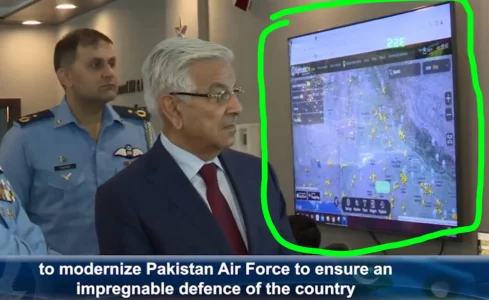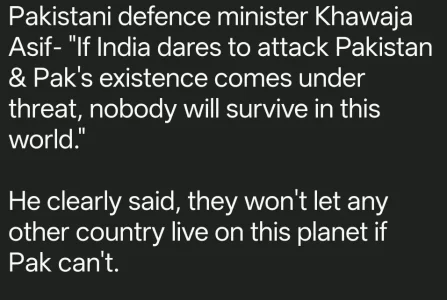You are using an out of date browser. It may not display this or other websites correctly.
You should upgrade or use an alternative browser.
You should upgrade or use an alternative browser.
Failed Terrorist State of Pakistan: Idiotic Musings
- Thread starter haldilal
- Start date
More options
Who Replied?- Joined
- Jun 30, 2024
- Messages
- 2,718
- Likes
- 23,942
What a fuckin' inbred parody of a country this abomination of a shithole porkistan is 


@Tactical Doge @Gslv Mk3
View: https://x.com/OsintTV/status/1919621482566799507
Free version it seems to make it worse



@Tactical Doge @Gslv Mk3
View: https://x.com/OsintTV/status/1919621482566799507
Free version it seems to make it worse

- Joined
- Jul 2, 2024
- Messages
- 999
- Likes
- 8,201
What a fuckin' inbred parody of a country this abomination of a shithole porkistan is
View attachment 33328
@Tactical Doge @Gslv Mk3
View: https://x.com/OsintTV/status/1919621482566799507
Free version it seems to make it worse
Maybe he has the subscription
- Joined
- Jul 6, 2024
- Messages
- 240
- Likes
- 1,899
Imran khan also walking in his footsteps. Methinks he's the second coming of Popat, apart from being the greatest RAA agent ever. What a great man.
F'ing shit.
This is at a whole different level.
Should make our muslim biradari to watch this
Moody's backs the mudi

 timesofindia.indiatimes.com
timesofindia.indiatimes.com

Big economic setback! Pakistan economy has more to lose than India - Moody's warning amid ongoing tensions - Times of India
India Business News: Moody's Ratings warns that ongoing tensions with India pose a greater economic risk to Pakistan than to India. Pakistan's growth and fiscal consolidat
- Joined
- Nov 30, 2024
- Messages
- 228
- Likes
- 1,894
- Joined
- Sep 29, 2024
- Messages
- 3,731
- Likes
- 19,402
Wonder what is written in that book that makes it's readers get such retardation levels of confidence?
- Joined
- Jul 2, 2024
- Messages
- 665
- Likes
- 2,052
Pakistan at the loosing end in this war
The disparity between Pakistan and India is so vast that, in the event of war, any perceived success for Pakistan would be illusory. As Major Manik M. Jolly aptly stated, “The overall imbalance of capabilities cannot be ignored. India is much stronger militarily, economically, and enjoys significant social cohesion (barring a few exceptions). Pakistan, on the other hand, lacks all of these advantages. Moreover, India stands in a far better position to garner international support.”
This reality renders many of the simplistic power comparisons between the two countries, often found in various publications, essentially meaningless. From 1955 to 2010, Pakistan relied heavily on American-made military equipment, which was once highly capable but is now obsolete and degraded. In recent years, it has turned to China, acquiring second-rate and often unreliable hardware—largely because China was the only supplier willing to sell on long-term credit. This has placed Pakistan in a precarious position: if it fails to repay its mounting debts—particularly from military purchases and CPEC investments—China could exert control over strategic assets like the Gwadar port. This is not just speculative; it’s a very real possibility.
Pakistan now appears to be relying on nuclear brinkmanship—part deterrent against India, part alarm bell for the international community—suggesting that a nuclear conflict is within the realm of possibility. India, however, has made it unequivocally clear that any use of nuclear weapons, even on Indian forces within Pakistani territory, would trigger an unrestrained nuclear retaliation. Still, before such a catastrophic scenario unfolds, the major global powers—deeply invested in preventing a nuclear conflict—would likely step in. They would move swiftly to neutralize Pakistan’s nuclear capabilities, allowing a conventional war to proceed.
But a conventional war would overwhelmingly favour India. Under such circumstances, Pakistan would likely seek a ceasefire. However, India might not agree to one until it has achieved its strategic objectives—most notably, the dismantling of Pakistan’s terror infrastructure, potentially including the disbanding of the ISI, in much the same way the Allies dismantled Hitler’s spy networks after World War II.
Pakistan should fervently hope that war never breaks out. It has neither the capacity to win nor the leverage to compel a ceasefire. It would be a lose-lose scenario. With the Indus Waters Treaty already suspended, a full termination is not unthinkable—and Pakistan would be powerless to stop it.
The disparity between Pakistan and India is so vast that, in the event of war, any perceived success for Pakistan would be illusory. As Major Manik M. Jolly aptly stated, “The overall imbalance of capabilities cannot be ignored. India is much stronger militarily, economically, and enjoys significant social cohesion (barring a few exceptions). Pakistan, on the other hand, lacks all of these advantages. Moreover, India stands in a far better position to garner international support.”
This reality renders many of the simplistic power comparisons between the two countries, often found in various publications, essentially meaningless. From 1955 to 2010, Pakistan relied heavily on American-made military equipment, which was once highly capable but is now obsolete and degraded. In recent years, it has turned to China, acquiring second-rate and often unreliable hardware—largely because China was the only supplier willing to sell on long-term credit. This has placed Pakistan in a precarious position: if it fails to repay its mounting debts—particularly from military purchases and CPEC investments—China could exert control over strategic assets like the Gwadar port. This is not just speculative; it’s a very real possibility.
Pakistan now appears to be relying on nuclear brinkmanship—part deterrent against India, part alarm bell for the international community—suggesting that a nuclear conflict is within the realm of possibility. India, however, has made it unequivocally clear that any use of nuclear weapons, even on Indian forces within Pakistani territory, would trigger an unrestrained nuclear retaliation. Still, before such a catastrophic scenario unfolds, the major global powers—deeply invested in preventing a nuclear conflict—would likely step in. They would move swiftly to neutralize Pakistan’s nuclear capabilities, allowing a conventional war to proceed.
But a conventional war would overwhelmingly favour India. Under such circumstances, Pakistan would likely seek a ceasefire. However, India might not agree to one until it has achieved its strategic objectives—most notably, the dismantling of Pakistan’s terror infrastructure, potentially including the disbanding of the ISI, in much the same way the Allies dismantled Hitler’s spy networks after World War II.
Pakistan should fervently hope that war never breaks out. It has neither the capacity to win nor the leverage to compel a ceasefire. It would be a lose-lose scenario. With the Indus Waters Treaty already suspended, a full termination is not unthinkable—and Pakistan would be powerless to stop it.
- Joined
- Jun 30, 2024
- Messages
- 2,718
- Likes
- 23,942
> 56% literacy rateWonder what is written in that book that makes it's readers get such retardation levels of confidence?
> 73% inbreeding rate
> 28 million kids out of school i.e. majority of their kids (highest on earth)
Rest in madarsa or doing child labour
> Then comes belief in a cult that believes that everything apart from mine is fake and a lie.
> Then add in a factor of false racial superiority, maybe as a result of inferiority complex of being steamrolled by everyone.
- Joined
- Jun 30, 2024
- Messages
- 2,718
- Likes
- 23,942
Latest Replies
-
Jokes Thread
- vampyrbladez
-
Pahalgam Islamic Terror Attack
- Gandaberunda
-
GTRE GTX 35VS Kaveri
- DancingPeacock
-
Failed Terrorist State of Pakistan: Idiotic Musings
- FalconSlayers
-
Indian Private Defence Sector
- fire starter
-
Small Arms and Weapons
- vampyrbladez
-
Indian Special Forces
- COLDHEARTED AVIATOR



